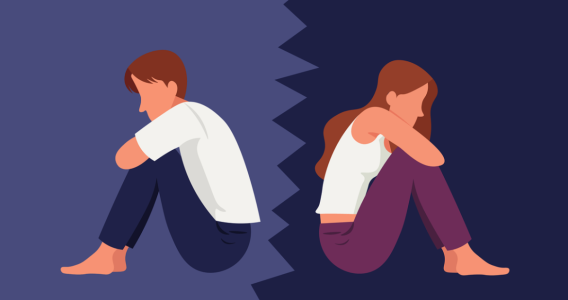Are lower-income couples being pushed apart due to Centrelink's partner income test?
- Replies 11
It's often said that love conquers all, and while that might be a wonderful sentiment, it doesn't necessarily mean it's true for everyone.
Sadly, as one Australian couple discovered, there are occasions when external forces can hinder a couple's ability to remain together.
Meg Honner and Andy McIntyre, a couple from Maitland, South Australia, are just one of the many couples out there who are unfortunately feeling the pinch of Centrelink policies.
Brought together by fate in 2019 after growing up together in Maitland, they decided to return to their hometown just before the COVID-19 pandemic hit.
Unfortunately, the timing could not have been worse.

'It was tough,' Meg said. 'Because of the pandemic, we didn't know where income was coming from.' Meg's work as a freelance art director dried up, while Andy, already unable to work due to health complications from a heart operation, relied on the Disability Support Pension (DSP) since 2013.
However, Centrelink terminated Andy's DSP last year after learning about his relationship with Meg. Meg's income barely put them over the fortnightly income cut-off limit of $3,297.60. Andy fell short by just $400, but that small amount was enough for their world to come crashing down.
The consequences were severe: Andy had to pay back his 'overpaid' pension dating back to early 2020, and the couple had to take out personal loans to make ends meet. From June 2020 to July 2021, Meg earned only about $22,000 as the pandemic hit many industries hard, and she's still struggling to pay off the loans.
The loss of DSP was devastating for Andy, who now has to rely entirely on Meg for financial support. 'When I was on disability income, you felt like you had independence. You could help with the groceries for the week, or you could help with something,' he said.
'As soon as that was gone, you felt useless.'
Due to their predicament, the couple can't help but consider the idea that they would be better off apart. 'I would get my disability [pension], Meg would get her wage, and she wouldn't have so much debt,' Andy said.
Meg contemplates the possibility, saying, 'I could do that tomorrow—move back to Adelaide and say we've broken up—and Andy would definitely be better off. But of course, we want to be together, so it's not an option.'
The couple understands the rationale for an income test for couples on high, consistent salaries but feels that fluctuating incomes are unfairly penalised. Meg suggests, 'Centrelink could be a bit more flexible for people who are borderline like us.'
Andy proposes a revamped system where DSP recipients can keep at least part of their support payment, regardless of the couple's income. '[They should] individualise people a bit more... just have it that there is an option there for people not to feel so disheartened,' he said.
The couple ultimately believes that their honesty in disclosing their relationship status to Centrelink has left them worse off.
'I feel like Centrelink looks at everyone as though they're lying to them,' Meg said. 'We were being honest about our situation, but there was no regard for us in any of their systems.'

What is the partner income test?
When Australians apply for income support, they are required to provide the government with information about their relationship status. If they are in a relationship, their partner's income is also taken into account, which can affect their eligibility for payments and the amount they receive.
This process ensures that financially vulnerable individuals still have access to welfare while also ensuring that taxpayer funds are used fairly and equitably.
If a recipient's relationship status changes, they are required to inform the government within two weeks of the relationship starting. Failure to do so can result in the issuance of debts, similar to what happened to Andy, due to overpayment.
In some cases, applicants are required to complete questionnaires to help the government determine whether they are part of a couple. These questionnaires cover various aspects, including living arrangements, shared household responsibilities, and joint assets. However, some questions, such as those regarding sexual activity, have been criticised by welfare advocates as invasive.
The specific thresholds at which Centrelink support payments are reduced or discontinued vary depending on the type of payment and individual circumstances.

It's an undeniably difficult situation that many of us may sympathise with, and unfortunately, there are many more stories of similar issues that go unheard. Members, have you or someone you know faced a similar situation? We encourage you to share your stories with us in the comments below.
Sadly, as one Australian couple discovered, there are occasions when external forces can hinder a couple's ability to remain together.
Meg Honner and Andy McIntyre, a couple from Maitland, South Australia, are just one of the many couples out there who are unfortunately feeling the pinch of Centrelink policies.
Brought together by fate in 2019 after growing up together in Maitland, they decided to return to their hometown just before the COVID-19 pandemic hit.
Unfortunately, the timing could not have been worse.

Meg and Andy love each other but say they'd be better off financially if they broke up. Credit: Pixabay/Pexels.
'It was tough,' Meg said. 'Because of the pandemic, we didn't know where income was coming from.' Meg's work as a freelance art director dried up, while Andy, already unable to work due to health complications from a heart operation, relied on the Disability Support Pension (DSP) since 2013.
However, Centrelink terminated Andy's DSP last year after learning about his relationship with Meg. Meg's income barely put them over the fortnightly income cut-off limit of $3,297.60. Andy fell short by just $400, but that small amount was enough for their world to come crashing down.
The consequences were severe: Andy had to pay back his 'overpaid' pension dating back to early 2020, and the couple had to take out personal loans to make ends meet. From June 2020 to July 2021, Meg earned only about $22,000 as the pandemic hit many industries hard, and she's still struggling to pay off the loans.
The loss of DSP was devastating for Andy, who now has to rely entirely on Meg for financial support. 'When I was on disability income, you felt like you had independence. You could help with the groceries for the week, or you could help with something,' he said.
'As soon as that was gone, you felt useless.'
Due to their predicament, the couple can't help but consider the idea that they would be better off apart. 'I would get my disability [pension], Meg would get her wage, and she wouldn't have so much debt,' Andy said.
Meg contemplates the possibility, saying, 'I could do that tomorrow—move back to Adelaide and say we've broken up—and Andy would definitely be better off. But of course, we want to be together, so it's not an option.'
The couple understands the rationale for an income test for couples on high, consistent salaries but feels that fluctuating incomes are unfairly penalised. Meg suggests, 'Centrelink could be a bit more flexible for people who are borderline like us.'
Andy proposes a revamped system where DSP recipients can keep at least part of their support payment, regardless of the couple's income. '[They should] individualise people a bit more... just have it that there is an option there for people not to feel so disheartened,' he said.
The couple ultimately believes that their honesty in disclosing their relationship status to Centrelink has left them worse off.
'I feel like Centrelink looks at everyone as though they're lying to them,' Meg said. 'We were being honest about our situation, but there was no regard for us in any of their systems.'
Key Takeaways
- Centrelink's partner income test is causing financial difficulties for lower-income couples such as Meg Honner and Andy McIntyre.
- The couple were left worse off after Andy's Disability Support Pension (DSP) was terminated when Meg's income pushed them just over the fortnightly income cut-off.
- Andy and Meg believe they would be better off apart, as they could both access financial support that way, but they want to remain together.
- They are calling for more flexibility and individualisation in the system for couples with fluctuating incomes so they are not unfairly penalised.
What is the partner income test?
When Australians apply for income support, they are required to provide the government with information about their relationship status. If they are in a relationship, their partner's income is also taken into account, which can affect their eligibility for payments and the amount they receive.
This process ensures that financially vulnerable individuals still have access to welfare while also ensuring that taxpayer funds are used fairly and equitably.
If a recipient's relationship status changes, they are required to inform the government within two weeks of the relationship starting. Failure to do so can result in the issuance of debts, similar to what happened to Andy, due to overpayment.
In some cases, applicants are required to complete questionnaires to help the government determine whether they are part of a couple. These questionnaires cover various aspects, including living arrangements, shared household responsibilities, and joint assets. However, some questions, such as those regarding sexual activity, have been criticised by welfare advocates as invasive.
The specific thresholds at which Centrelink support payments are reduced or discontinued vary depending on the type of payment and individual circumstances.

When people in relationships apply for welfare payments, their partner's income is also assessed as part of their eligibility. Credit: Pixabay/HtcHnm.
It's an undeniably difficult situation that many of us may sympathise with, and unfortunately, there are many more stories of similar issues that go unheard. Members, have you or someone you know faced a similar situation? We encourage you to share your stories with us in the comments below.







